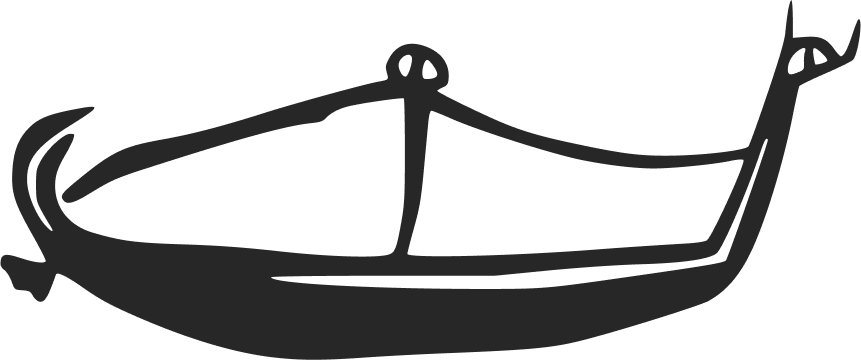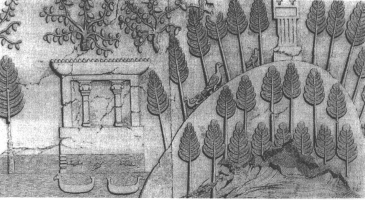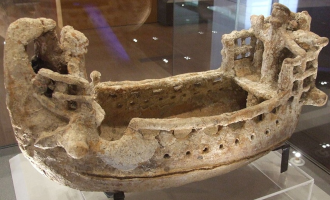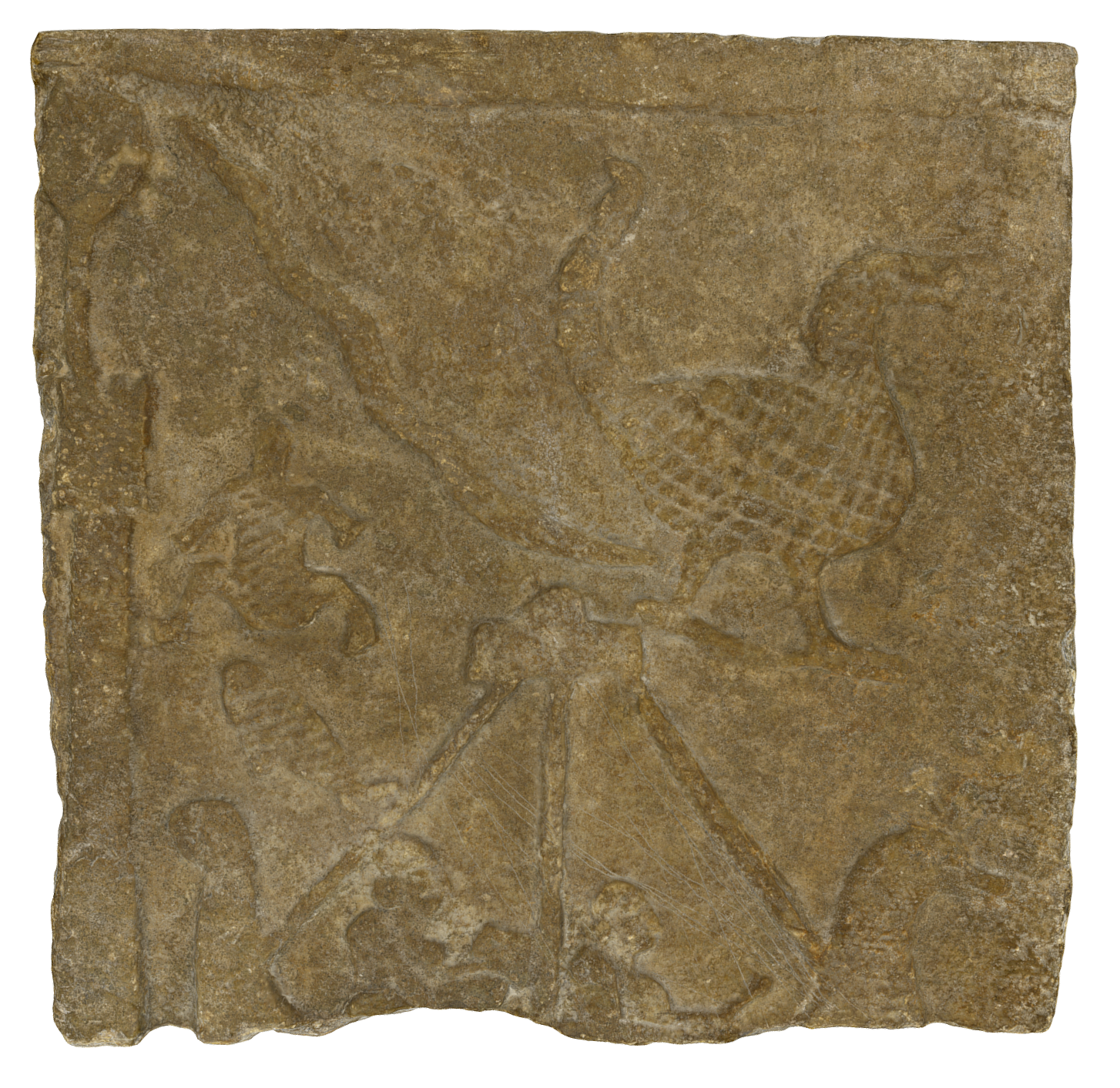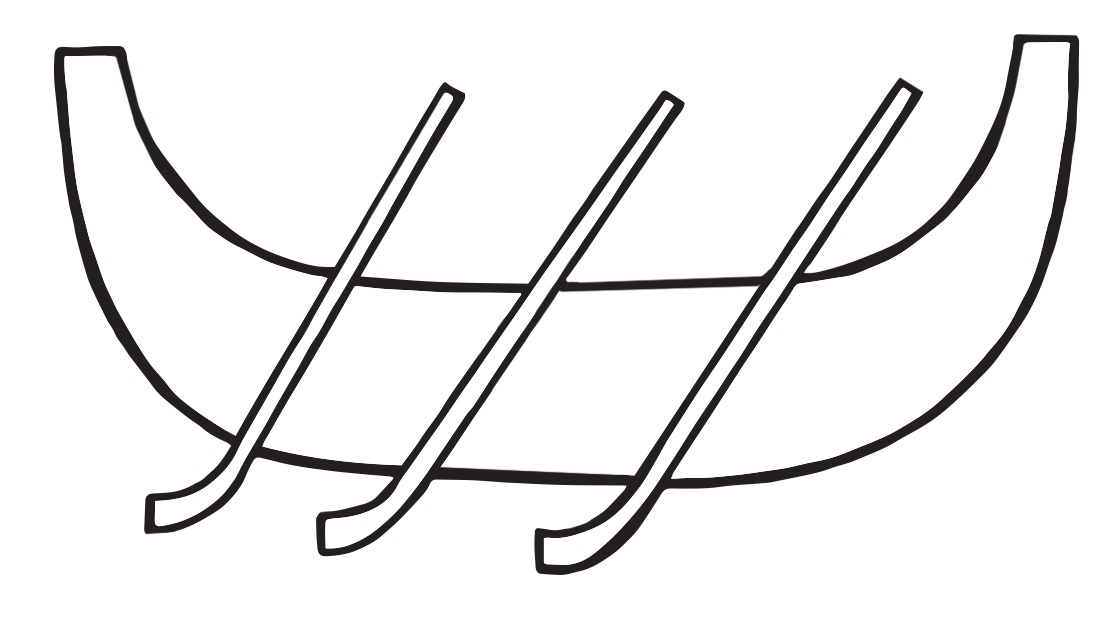L26a (larger right ship): vessel to the
right, with a flat hull and high vertical posts which are symmetrical in
shape except for their different decorative zoomorphic devices. The
stempost ends in a naturalistic duck head while the sternpost has a
smaller feline-headed device. The mast is amidships with a fore- and a
back stay, and a rectangular device at the top that could be either the
mast cap or a crow's nest, itself capped by a circular knob-like
feature. Two figures are depicted facing towards the prow, sitting
upright on each side of the mast and operating an oar or paddle each.
L26b (smaller left ship): vessel to the
right, with a flat hull and high symmetrical posts with a slight, near
vertical incline. The posts are undecorated, with a flat horizontal end.
This boat has no mast. Its three crewmembers appear to be paddling while
standing up.
Two ships
L28a-b
730 B.C.
Palace of Tiglath-Pileser III, Nimrud
H: 46 cm; W: 46 cm
Gypsum wall panel relief
Barnett and Falkner 1962: 17, pl. LVII; Basch 1987: 309-10, no. 652; Botta 1849: pl. 32-34; Layard 1849 (vol.2): 382, 395; Smith 1938: pl. 24; Trakadas 1999: 56-58, fig. 19; Unger 1917: no. 15
Tiglath-Pileser III's palace was destroyed by Esarhaddon (679-669 B.C.) who had planned to re-use the reliefs as decorations of his new royal residence. The panels were therefore found damaged and stacked. This particular relief was found damaged and out of context. Any identification of the scene therefore remains purely conjectural. The preserved slab from the British Museum was part of a larger scene drawn by Layard which shows some inaccuracies, such as a missing fish above the backstay of the right ship.
The scene depicts a fortress built on an island, with seven turrets and an arched gateway. Three of its turrets on the left of the gateway are higher, while the three turrets to its right have a tree on top of each (date-palm and two cypress). In the flattened depiction style the trees are therefore understood to be growing inside the fortified city. To the right of the island fortress is a vessel with zoomorphic stem and sternpost devices operated by two bearded figures. A second smaller boat with no post decorations manned by three figures is located further below it to the left. Above and around the boats the landscape is filled with fauna, including several fish, eels or sea-snakes, a frog or a turtle, a tortoise, and a large bird with a snake-like tail. A crab was originally balanced by a tortoise in the lower section of the frieze.
The larger vessel is remarkably similar to some of the boats depicted on the Sargon II maritime relief, except for the post decorative devices which are different. Neither ship is depicted on a reliable scale, with the rowers being merely used as filler. Thus L28a shows only two of them despite being a seagoing vessel, as indicated by its rigging.
Barnett, R. D. and M. Falkner. 1962. The Sculptures of Ashur-nasir-apli II (883-859 B.C), Tiglath-pilesar (745-727 B.C), Esarhaddon (681-669 B.C) from the Central and South-West Palaces at Nimrud. London: British Museum Press.
Basch, L. 1987. Le musée imaginaire de la marine antique. Athens: Institut Hellénique pour la preservation de la tradition nautique.
Botta, M. P. E. 1849. Monument de Ninive I. Paris: Imprimerie Nationale.
Layard, A H. 1849. Nineveh and its Remains. London: John Murray.
Smith, S. 1938. Assyrian Sculptures in the British Museum: from Shalmaneser III to Sennacherib. London: British Museum Press.
Trakadas, A. L. 1999. “Skills as Tribute: Phoenician Sailors and Shipwrights in the Service of Neo-Assyria.” MA dissertation, Texas A&M University, US.
Unger, von E. 1917. Die Reliefs Tiglatpilesars III. aus Nimrud. Konstantinopel: A. Ihsan.
